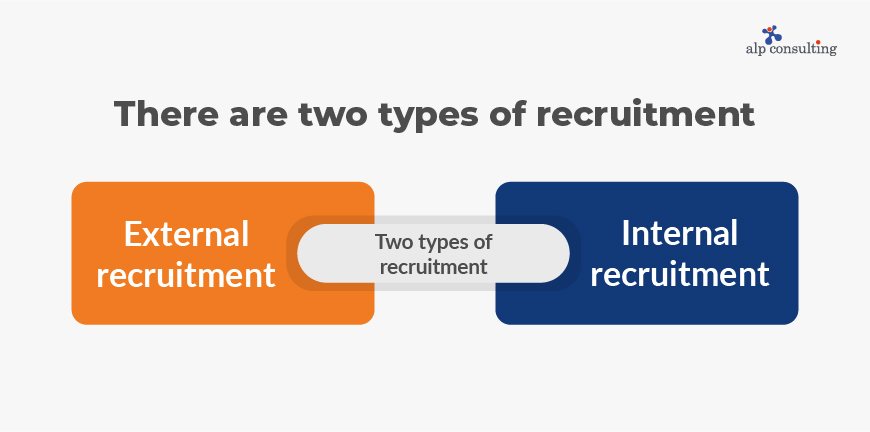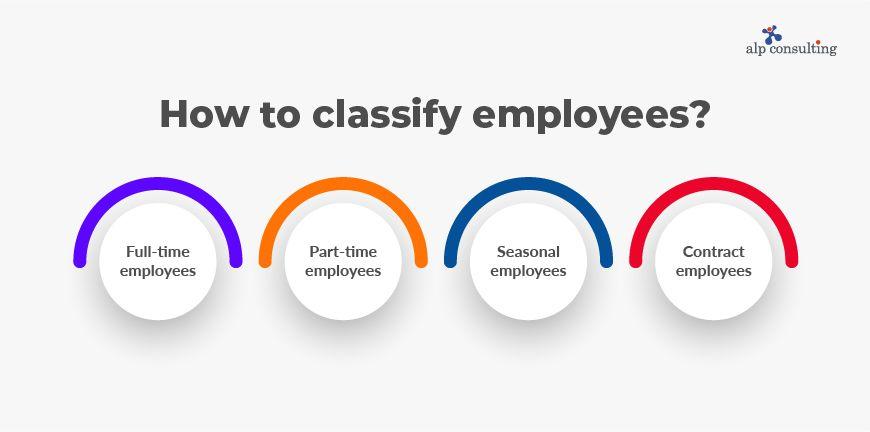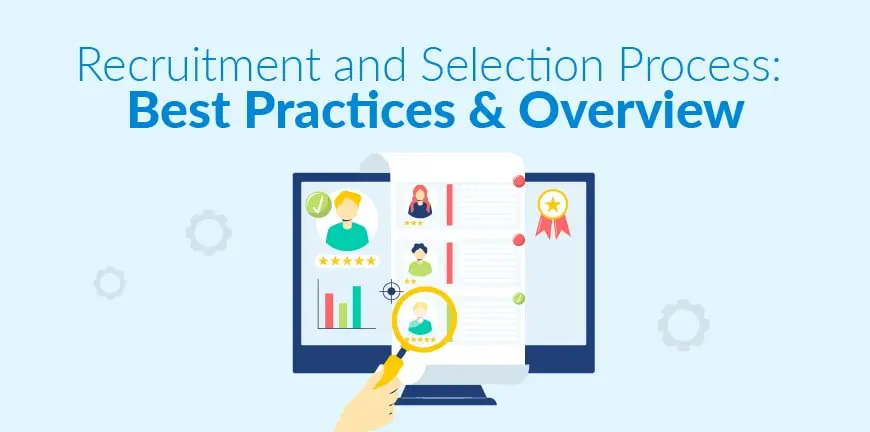
What Is a Passive Candidate? Definition, Tips, Challenges
20/04/2024
Winning the Talent War in the Semiconductor Industry
29/04/2024- Recruitment and Selection Process: Introduction
- What is Recruitment?
- What is Selection?
- What is the difference between recruitment and selection?
- Why is effective recruitment and selection important?
- 6 steps in the recruitment and selection process
- What are the Benefits of outsourcing the recruitment & selection process?
- Are you looking for a recruitment partner?
- FAQs on Recruitment and Selection
Recruitment of the right candidate is like music to the ears, as it is one of the most rewarding yet challenging tasks for an HR (Human Resources) professional and the organization. The recruitment and selection process is as complex and complicated as it sounds. The process of finding the right candidate is not an easy one, let alone recruiting one. It takes years to craft, perfect, and master the ideal recruitment process, and even when you do, you still fall short.
A well-crafted recruitment and selection process in HRM (human resource management) allows the HR team to gather a talented pool of candidates and then filter them out one by one until they have found the one. While the recruitment and selection processes are both different in nature and involve distinct steps, they are, of course, interrelated and intertwined when it comes to their purpose.
Recruitment and Selection Process: Introduction
The recruitment and selection process involves several tasks to be performed by the recruiter during the entire recruitment cycle, like identifying, engaging, recruiting, and finally hiring a candidate who is hopefully the best fit for the role you are looking to hire for.
But wait, even before they can start the above-mentioned tasks, there is a need for some groundwork to be done, like:
- Crafting a job description that attracts the target candidates.
- A quirky call to action to nudge potential candidates to hit apply.
- A smooth online application process.
What is Recruitment?
Recruitment is a process through which potential candidates are identified, sourced, and recruited for the open positions in an organization through various recruitment methods. The goal is to gather as many candidates as possible in order to pick the best one for the job.
There are two types of recruitment.

1. External recruitment
Recruiters look for candidates outside the organization in this type of recruitment. They try to identify and source candidates by posting their requirements on job sites, social media, or even their own career site. A smart recruiter would also look for passive potential candidates who aren’t actively looking for a job as well.
2. Internal recruitment
Here, recruiters advertise their open role to employees working within the organization, in an attempt to promote from one rather than going through the arduous process of finding someone new and integrating them into the organization and company culture. You would be surprised how many times this has gained optimum results.
What is Selection?
The Selection process is one where all of the candidates deemed fit for the profile are assessed by their qualities, expertise, and skills, and to skim down the list of candidates to find the best one for the role. The selection process involves setting up and conducting interviews using various tests to evaluate their performance.
An effective recruitment and selection process in HRM facilitates companies to source, attract, and identify candidates for open roles in their organization. A good recruitment and selection process helps reduce attrition, increase the firm’s as well as employee productivity.
What is the difference between recruitment and selection?
Recruitment and selection are two quite distinct functions and are implemented at various times during the hiring process. The stages of the recruitment and selection process involve distinct steps leading to the recruitment of the best candidate for the job.
To help you understand better the differences between the recruitment and selection processes, we have mapped out the differences between the two. Let’s take a look.
| Recruitment | Selection | |
| Definition | Target suitable candidates, introduce the open role, and get their attention | The list of gathered candidates is analysed through assessments and tests. |
| Aim | Attract a large pool of potential candidates with skills and qualifications that match the requirements of the open position | Filter out candidates from the list of potential candidates after a thorough assessment of skills and experience. |
| Process | Crafting a solid job description and posting it on job sites, social media, and other portals to attract a pool of candidates | Involves a thorough analysis of the candidates through background checks, various assessments, and suitable tests, determining their skills and selecting the best of the lot |
| Nature | Not expensive or time-consuming | It can be expensive and time-consuming. |
| Complexity | The vacancies are communicated, but no contracts are signed during this stage | The company must craft a contractual agreement between the firm and the selected candidate |
Why is effective recruitment and selection important?
The objective of a recruitment and selection process is to identify and recruit a candidate who is not only the best fit for the role but will stay on for a long time as well. An effective recruitment and selection process is important for several reasons that directly contribute to the productivity of the organisation.
1. Attracting the best pool of candidates
The right recruitment process helps attract not just active job seekers but the passive ones as well. The passive candidates are not to be overlooked just because they aren’t seeking, as they may be the ones who are perfect for your open position with the right set of skills and qualifications, and also because they comprise about 70% of the workforce.
2. Reduced turnover and absenteeism
The two are one of the key issues that an organization faces. An effective recruitment and selection process can help build a talent pipeline and greatly reduce attrition rates and absenteeism. When you select the right person for the job, chances are they will carry out their duties and perform to their best ability, and will think of staying long-term.
3. Cost saving
Not hiring for an open position in an organization can result in financial losses. But again, hiring the wrong person for the role could cost you even more. This is why you must have an effective recruitment and selection process in place in your organisation.
4. An unbiased recruitment
The right recruitment and selection process will ensure that all the potential candidates are given equal opportunities to prove their ability to fit the job role regardless of race, religion, and gender. This allows the recruitment of the best candidate for the position.
6 steps in the recruitment and selection process
The recruitment and selection process includes various tasks to complete to find the right one. Here are the 6 key steps to follow for a successful recruitment and selection process in HRM-

1. Crafting an appealing, kickass job description
This is the first and one of the most important steps in the process. A job description gives the first impression of the company to a potential candidate, so it must be right. To ensure you get the best of the candidates, your job description must reflect who you are as a company, your culture, and what exactly is expected of the candidate looking to apply for the position. Keep it straightforward. Keep it Gen Z-friendly, do not sound too serious, but make sure you lay out your expectations as well as your offerings to the candidate.
2. Market your job posting in the right places at the right time
Visibility of your company’s open position at the right places is important. Understand your target candidates and where they would look before posting your job opening. Try posting in places out of the usual ones, like normal job portals and social media platforms. Remember, you must tap into the passive candidates as well. And the passive ones won’t be looking at job portals. So be active on social media; it helps a great deal.
3. Thorough screening of resumes
This one is tough because there is only so much you can rely solely on a resume. It won’t really show you who your candidate actually is. But still, it’s the first impression you get of your candidate. So, just to screen out the completely irrelevant ones, make sure you screen resumes thoroughly based on skills and requirements. To avoid bias, you can try out blind screening to assess candidates.
4. Schedule a series of interviews before making your final decision
Once you have your filtered-out list of candidates, it’s time to set up one-on-one interviews for them with the department heads, stakeholders, etc, as per your business requirements. It’s where you will understand a candidate a bit more on a personal as well as a professional level. What they are capable of, their confidence levels, attitude, etc. It helps decide whether they are the right fit for the position as well as the company culture.
5. Take the help of tests and assignments to help analyse candidates better
When you are looking at a few potential candidates for the role, you can analyse your candidates better by providing them with tests and assessments that can gauge their technical and problem-solving skills as well as get a clear understanding of their previous employment record and how their roles defined them. Some tests you can give them are-
- Personality tests
- Skill tests
- Psychometric tests etc
6. Make your final hire
Once you have put your candidates through the various tests and interviews, you will have decided on your final candidate. Ensure a smooth onboarding process with the right orientation program explaining the candidate about the company mission, vision, values, the role expectations, paperwork to be filled by the candidate for compliance purposes, a proper contractual agreement of their employment with you with all details including their compensation, benefits, leave policies etc and integrate them into the company by providing them with the right resources.
What are the Benefits of outsourcing the recruitment & selection process?
The recruitment and selection process is a tedious, time-consuming process. If you are doing it in-house, make sure you have a dedicated team to follow through with the entire process. But suppose you have second thoughts about your in-house team handling it effectively, along with various other tasks. In that case, we suggest you outsource it to a third-party recruitment services provider with the resources and experience to handle it.
Some of the advantages of outsourcing your recruitment and selection process are:
1. Access to a talented pool of candidates
A recruitment partner like Alp Consulting, with years of experience in the industry, can help enhance your recruitment process by giving you access to a large pool of talented candidates with the right skills and experience suitable for your open positions.
2. Unbiased recruitment
Outsourcing your hiring process to an expert third party helps eliminate any hiring bias, which otherwise could happen if you decide to do it in-house, consciously or unconsciously. An expert third party will ensure you get the best candidates as they go about the process very organically.
3. Cost and time saving
A recruitment and selection process in HRM (Human Resource Management) can be financially draining and time-consuming for a company. From putting up job postings, identifying, screening to following through the selection process and setting interviews and reminders, along with the background check runs, etc, requires quite an amount. And on top of all that, if a bad hire is made, that would cost the company more in the long run, which is why outsourcing it to an expert recruitment services provider with a reputation and experience can help you save money as well as precious time that can be used to focus on core business operations.
4. Scalability
Outsourcing allows organizations to scale up or down their hiring efforts based on fluctuations in demand without overburdening their internal HR team.
Are you looking for a recruitment partner?
Recruitment and selection are a crucial part of the hiring process for organizations looking to hire the right individuals for their open positions. A systematic, well-crafted, and well-thought-out process is essential to attract, select, and retain the best candidates.
Alp Consulting, with an experience 30 years of experience in the industry, has a reputation for being one of the best recruitment service providers. From Fortune 500 companies to small-scale and startups, we have provided our clients with tailored recruitment solutions that have ensured them the best hires and helped them build a talent pipeline, reduced attrition rates, and increased productivity.
If you are looking for an ideal recruitment partner, talk to us today, and we will help you find a solution that is perfect for your business.
FAQs on Recruitment and Selection
1. What is recruitment and selection?
Recruitment and selection are the two stages of a full-scale hiring process that involve tasks like identifying, sourcing, screening, and interviewing candidates to make a final hire who is perfect for the open position in an organization.
2. What is a recruitment and selection strategy?
An effective recruitment and selection strategy involves several important steps-
- Crafting the perfect job description and posting on the right platforms
- Gathering a large pool of potential candidates to choose from
- A thorough screening process backed by assessments, tests to make the right analysis
- Set up and schedule interviews with the right hiring panels
- Onboard the selected candidate with the right paperwork in place
3. What are the methods of recruitment and selection?
Recruitment methods can vary and may include-
- Job postings
- Online job boards
- Social media recruitment
- Employee referrals
- Campus recruiting
- Recruiting
- Recruitment agencies
4. What is hr role in recruitment and selection?
The role of HR is to create a positive and productive work environment by helping employees grow, ensuring they follow the law, and managing data. Recruitment remains at the core of HR’s efforts. HR professionals carefully find, screen, and evaluate potential hires to build a talented team.





